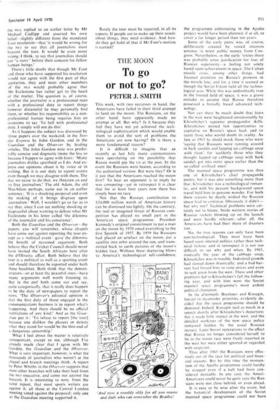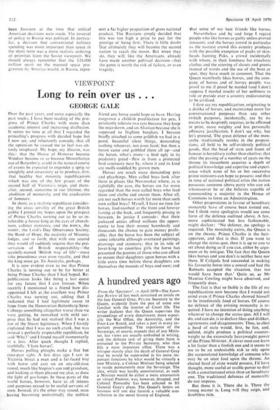THE MOON
To go or not to go?
PETER J. SMITH
This week, with two successes in hand, the Americans have failed in their third attempt to land on the moon. The Russians, on the other hand, have apparently made no attempt at all. But why? Is it because they feel they have not yet achieved the tech- nological sophistication which would enable them to avoid the sort of problems the Americans are now having? Or is there a more fundamental reason?
It is difficult to imagine that as recently as last July many commentators were speculating on the possibility that Russia would pip the us at the post. In the event the Russians were beaten, according to the authorised version. But were they? Or is it just that the Americans reached the moon first? To beat an opponent is to imply he was competing—yet in retrospect it is clear that for at least four years now there has simply been no race.
Not that the Russian contribution to S24,000 million worth of American history can be dismissed too lightly. On the contrary, the real or imagined threat of Russian com- petition has played no small part in the American space programme. President Kennedy's original commitment to put a man on the moon by 1970 owed everything to the first Sputnik of 1957. By 1959 the Russians had placed an artefact on the moon, put a satellite into orbit around the sun, and trans- mitted back to earth pictures of the moon's hidden face. Without these shattering blows to America's technological self-confidence, 'And now a mouldy oldy for all you mums and dads who can remember the Beatles: the programme culminating in the Apollo project would have been planned, if at all, to cover a far longer period than ten years.
Some of the early panic was, of course, deliberately created by vested interests anxious to wrest public money from Con- gress. Nevertheless. in the early 'sixties there was probably some justification for fear of Russian superiority—a feeling not solely based upon achievement in space. The Cuban missile crisis, among other things, had focused attention on Russia's prowess in the missile line; and for a time it seemed as though the Soviet Union held all the techno- logical aces. While this was undoubtedly true in the limited field of space, it was a grave mistake to assume that Russia therefore possessed a broadly based advanced tech- nology.
Nor can there be much doubt that fears in the west were heightened unreasonably by Khrushchev's supreme propagandist skills. Khrushchev missed few opportunities to capitalise on Russia's space lead, and to taunt those who would doubt its reality. As late as 1963 he dould mock those who were 'saying that Russians were running around in bark sandals and lapping up cabbage soup with them', for 'suddenly those who they thought lapped up cabbage soup with bark sandals got into outer space earlier than the so-called civilised ones'.
The manned space programme was thus one of Khrushchev's chief propaganda points; but it was also something more than that. Khrushchev was a technological roman- tic, and with his peasant background space travel held him in genuine wonder. For both these reasons he dearly wished the Russian space lead to continue. Obviously it didn't— but why not? Technical problems were cer- tainly not to blame. Snide western stories of Russian rockets blowing up on the launch pad were hardly relevant—after all, the Americans have had their share of disasters too.
No, the true reasons can only have been non-technological. They must have been based upon internal politics rather than tech- nical failure; and in retrospect it is not too difficult to see why and when. By 1963, ironically the year of the cabbage soup, Khrushchev was in trouble. Industrial growth had slowed down drastically; and a bad har- vest had forced him to raise prices and even to seek grain from the west. These and other problems led to Khrushchev's fall the follow- ing year. and with him went the Soviet manned space programme's most ardent political champion.
In the aftermath. Brezhnev and Kosygin, forced to reconsider priorities, evidently de- cided ;hat the space programme should be demoted. Indeed. Kosygin said as much in a speech shortly after Khrushchev's departure; but it made little impact in the west, and the detailed workings of the new space policy remained hidden by the usual Russian secrecy. Later Soviet reiterations to the effect that Russia no longet considered herself to be in the moon race were freely reported in the west but were either ignored or regarded with suspicion.
Thus after 1965 the Russians were effec- tively out of the race for political and finan- cial reasons. But by this time the momen- tum of the Apollo programme could hardly be stopped even if a halt had been con- sidered desirable. In any case. the Amen- Americans could never be quite sure the Rus- sians were not close behind, or even ahead.
It is easy to be wise after the event, but the historical development of the Soviet manned space programme could not have
been foreseen at the time that critical American decisions were made. The reversal of policy in Russia was political. In particu- lar, a decision that conventional military spending was more important than space in the short term was a more realistic ordering of priorities from the Soviet viewpoint. We should always remember that the $24,000 million spent on the manned space pro- gramme by America would, in Russia, repre-
sent a far higher proportion of gross national product. The Russians simply decided that this was too high a price to pay for the prestige of being first. There is little doubt That ultimately they will become the second nation to reach the moon. But when they do, they will, like the Americans, already have made another political decision—that the game is worth the risk of failure, or even tragedy.







































 Previous page
Previous page